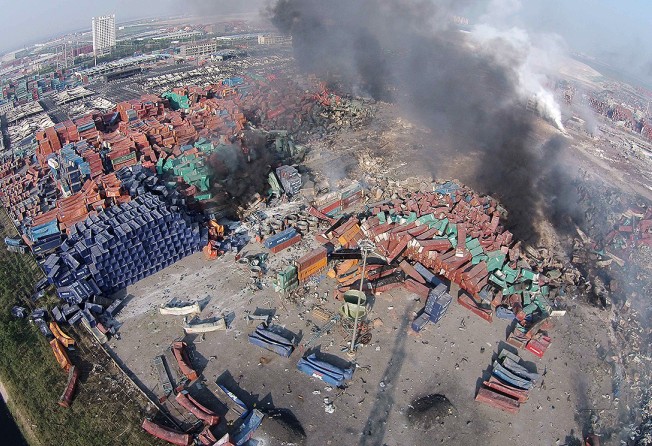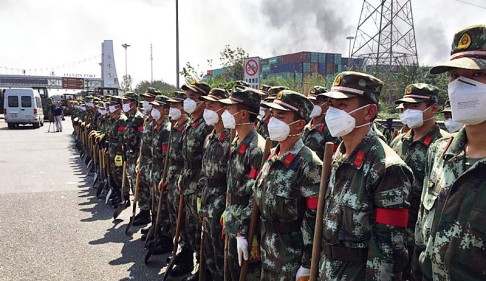Depot blast would not have ‘significant impact’ on nearby residents, said initial expert report
When yard was renovated last year to house dangerous materials, Tianjin Academy of Environmental Sciences said safety measures were adequate

A fire or blast at the warehouse yard operated by Ruihai International Logistics which was levelled in Wednesday night’s disaster would not have a considerable impact on the surrounding area, an official environmental evaluation report concluded last year.
The evaluation was carried out by the Tianjin Academy of Environmental Sciences ahead of the yard’s renovation into a hazardous materials storage site. Ruihai had earmarked 9 million yuan (HK$10.9 million) to make the changes to the 42,000 square metre yard, according to the academy. The goods would be stored there temporarily while they were in transit.
The facility could annually handle 20,000 tonnes of dangerous goods or 50,000 tonnes of ordinary goods a year, it said.
The academy pointed to a fire risk presented by 2,4-Toluene diisocyanate – a chemical intermediate in the production of polyurethane products and also known as TDI – natural gas and hydrogen chloride.
A follow-up government inspection report said Ruihai transported and stored dangerous articles such as TDI, potassium nitrate and condensed natural gas.
However, the academy report concluded that “after taking relevant precautions and emergency measures”, accidents involving leaking goods or fire would “not have a significant impact on the environment and neighbouring people”.
The report also said that the warehouse holding combustible goods was equipped with automatic fire alarms and the two other warehouses had manual alarms. The report concluded: “Firefighters can arrive at the scene in time in case of fire or explosion and take fire extinguishing measures to contain release of toxic materials.”
An earlier public consultation on the project carried out in May 2013 stated there were certain risks in the transport and storage of the goods, but the accident risks were within an acceptable level given the precautions in its emergency plans.
Meanwhile, a worker from Ruihai, who had a narrow escape when he left the yard to buy food, told China National Radio yesterday that he loaded and unloaded dangerous goods at the site but had never received special training.
Ruihai was founded in 2011 and is situated at the Tianjin Port International Logistics Centre. The company has a large transit and distribution centre of dangerous goods in Tianjin and is certified to handle dangerous goods. It has two dangerous goods warehouses and one transit warehouse.
Several other logistics companies are nearby.
News website Thepaper.cn said several people who helped prepare the academy’s evaluation has been summoned by the municipality’s government.
An unidentified source from the academy told the outlet the blast was a production accident and had nothing to do with the environmental evaluation.
A national regulation on running business involving dangerous chemicals in 2001 stipulated that dangerous goods warehouses should be at least 1,000 metres away from any public building.
Yet at least one residential building, developed by Vanke property firm, was inside the “protective zone”.
Harbour City was about 700 metres away from the warehouse and several owners complained they were not aware dangerous goods were being stored nearby.
An unidentified professor with Xian University of Architecture and Technology told the National Business Daily that based on his experience in planning the warehouse was too close to residential buildings.
The company last year sent out 130 questionnaires and 100 per cent of the public deemed the site of the project appropriate, according to the academy’s report.



